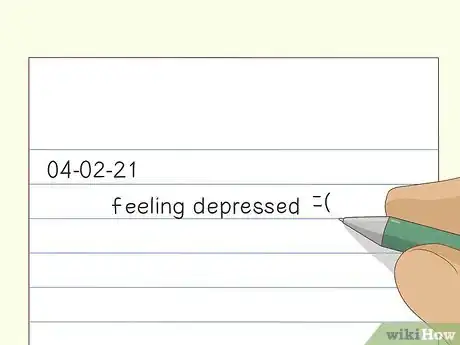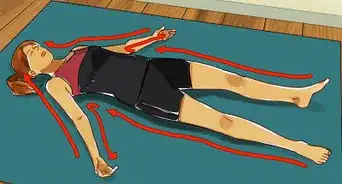This article was co-authored by Michelle Shahbazyan, MS, MA and by wikiHow staff writer, Christopher M. Osborne, PhD. Michelle Shahbazyan is the Founder of The LA Life Coach, a concierge life, family, and career coaching service based in Los Angeles, California. She has over 10 years of experience with life coaching, consulting, motivational speaking, and matchmaking. She has a BA in Applied Psychology and an MS in Building Construction and Technology Management from Georgia Tech University, and a MA in Psychology with an emphasis on Marriage and Family Therapy from Phillips Graduate University.
There are 16 references cited in this article, which can be found at the bottom of the page.
This article has been viewed 280,653 times.
Whether you’re just having a bad day or are dealing with ongoing grief or depression, there are things you can do to feel happier. This article lists several ways to increase your happiness, starting with quick happiness boosters and moving on to advice for managing long-term sadness. So, no matter your situation, keep reminding yourself that you can become happy again! Also, remember your life matters to somebody somewhere.
This article is based on an interview with our matchmaker, Michelle Shahbazyan, founder of The LA Life Coach. Check out the full interview here.
Steps
Expert Q&A
Did you know you can get expert answers for this article?
Unlock expert answers by supporting wikiHow
-
QuestionWhat should I do if I am feeling lost in life?
 Michelle Shahbazyan, MS, MAMichelle Shahbazyan is the Founder of The LA Life Coach, a concierge life, family, and career coaching service based in Los Angeles, California. She has over 10 years of experience with life coaching, consulting, motivational speaking, and matchmaking. She has a BA in Applied Psychology and an MS in Building Construction and Technology Management from Georgia Tech University, and a MA in Psychology with an emphasis on Marriage and Family Therapy from Phillips Graduate University.
Michelle Shahbazyan, MS, MAMichelle Shahbazyan is the Founder of The LA Life Coach, a concierge life, family, and career coaching service based in Los Angeles, California. She has over 10 years of experience with life coaching, consulting, motivational speaking, and matchmaking. She has a BA in Applied Psychology and an MS in Building Construction and Technology Management from Georgia Tech University, and a MA in Psychology with an emphasis on Marriage and Family Therapy from Phillips Graduate University.
Life Coach Think about how you want to give back to society, because we all need each other in some shape or form. If you think about how you're interested in giving back to the world, that is usually a good starting point to find purpose. In terms of productivity, it's important to know that a mental stalemate is intertwined with your body. Try to get your body moving, and usually your mind will get moving too. Also try to read and get new information, as new incoming thoughts can create new outgoing ideas.
Think about how you want to give back to society, because we all need each other in some shape or form. If you think about how you're interested in giving back to the world, that is usually a good starting point to find purpose. In terms of productivity, it's important to know that a mental stalemate is intertwined with your body. Try to get your body moving, and usually your mind will get moving too. Also try to read and get new information, as new incoming thoughts can create new outgoing ideas. -
QuestionHow can I get out of a 35 year marriage that has had problems since the beginning?
 Tasha Rube, LMSWTasha Rube is a Licensed Social Worker based in Kansas City, Kansas. Tasha is affiliated with the Dwight D. Eisenhower VA Medical Center in Leavenworth, Kansas. She received her Masters of Social Work (MSW) from the University of Missouri in 2014.
Tasha Rube, LMSWTasha Rube is a Licensed Social Worker based in Kansas City, Kansas. Tasha is affiliated with the Dwight D. Eisenhower VA Medical Center in Leavenworth, Kansas. She received her Masters of Social Work (MSW) from the University of Missouri in 2014.
Licensed Master Social Worker Have an intentional and respectful discussion with your marriage partner about your feelings. Set your intentions and allow them to also speak their voice. Then, talk to a lawyer about your rights based on divorce laws within your state. Gather as much emotional support from friends and family that you can muster, as it will be a difficult process.
Have an intentional and respectful discussion with your marriage partner about your feelings. Set your intentions and allow them to also speak their voice. Then, talk to a lawyer about your rights based on divorce laws within your state. Gather as much emotional support from friends and family that you can muster, as it will be a difficult process. -
QuestionWhat if I'm depressed and I don't know why?
 Tasha Rube, LMSWTasha Rube is a Licensed Social Worker based in Kansas City, Kansas. Tasha is affiliated with the Dwight D. Eisenhower VA Medical Center in Leavenworth, Kansas. She received her Masters of Social Work (MSW) from the University of Missouri in 2014.
Tasha Rube, LMSWTasha Rube is a Licensed Social Worker based in Kansas City, Kansas. Tasha is affiliated with the Dwight D. Eisenhower VA Medical Center in Leavenworth, Kansas. She received her Masters of Social Work (MSW) from the University of Missouri in 2014.
Licensed Master Social Worker
References
- ↑ https://www.psychologytoday.com/us/blog/click-here-happiness/201801/how-be-happy-23-ways-be-happier
- ↑ http://www.apa.org/monitor/2011/12/exercise.aspx
- ↑ Michelle Shahbazyan, MS, MA. Life Coach. Expert Interview. 18 March 2020.
- ↑ https://www.psychologytoday.com/blog/reading-between-the-headlines/201307/vitamin-d-deficiency-and-depression
- ↑ Michelle Shahbazyan, MS, MA. Life Coach. Expert Interview. 18 March 2020.
- ↑ https://www.nhs.uk/live-well/healthy-body/how-to-get-vitamin-d-from-sunlight/
- ↑ https://www.nytimes.com/2018/10/10/smarter-living/follow-your-passion-hobbies-jobs-self-care.html
- ↑ https://www.health.harvard.edu/blog/nutritional-psychiatry-your-brain-on-food-201511168626
- ↑ Michelle Shahbazyan, MS, MA. Life Coach. Expert Interview. 18 March 2020.
- ↑ https://advancedpsychiatryassociates.com/resources/blog/solo-activities-for-depression/
- ↑ https://psychcentral.com/blog/are-you-keeping-busy-to-avoid-your-feelings#1
- ↑ https://www.nami.org/Blogs/NAMI-Blog/April-2016/Five-Ways-to-Stay-Productive-During-Depression
- ↑ Michelle Shahbazyan, MS, MA. Life Coach. Expert Interview. 18 March 2020.
- ↑ https://advancedpsychiatryassociates.com/resources/blog/solo-activities-for-depression/
- ↑ https://www.helpguide.org/articles/grief/coping-with-grief-and-loss.htm
- ↑ https://www.nytimes.com/guides/well/how-to-be-happy
- ↑ https://www.sciencedaily.com/releases/2019/04/190412094728.htm
- ↑ https://psychcentral.com/blog/are-you-keeping-busy-to-avoid-your-feelings#1
- ↑ Michelle Shahbazyan, MS, MA. Life Coach. Expert Interview. 18 March 2020.
- ↑ https://www.helpguide.org/articles/depression/depression-symptoms-and-warning-signs.htm
- ↑ https://988lifeline.org/
- ↑ https://www.crisistextline.org/
- ↑ https://www.helpguide.org/articles/grief/coping-with-grief-and-loss.htm
About This Article
It can be tough when you're feeling low or in a rut, but with a few small changes to your routine, you can start to feel happier again! Set a few goals for yourself each day, even if it’s something small like taking a walk or practicing guitar for half an hour. This will help you stay busy and keep track of your accomplishments. Aim to exercise for at least 30 minutes a day, which will release endorphins and help you feel better. Consider talking to a therapist, or at least a close friend, about how you feel. Often, sharing your thoughts and feelings can help to make sense of them. Try to be patient with yourself. Negative emotions can be difficult, but they won’t last forever. If you’re feeling particularly hopeless or you’re having suicidal thoughts, call a hotline so you can talk to someone and get help. In the U.S. you can call 1-800-784-2433. For more tips from our co-author, including how to deal with a painful breakup, read on.














































































